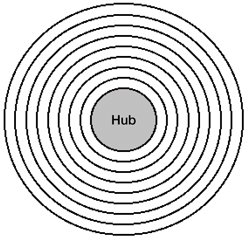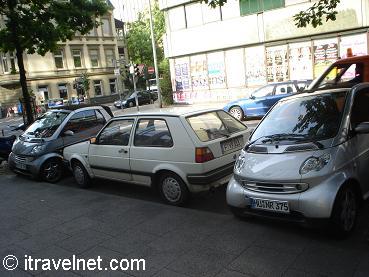The mobility shed revisited
(For the most part, this is a reprint from last year)

Think of the rings as being of variable size and representing the "shed" of different forms of mobility used to bring people to and from subway-light rail-transportation centers. A mobility shed can be conceived of as the geographic area around a transit station or stop, or an entire bus-streetcar line.
"Conservatives" like to criticize society post-1960s as degenerating into a valueless sphere of relativistic thinking. It happens that this is a pretty facile approach to the nuances involved in cognitive development. I have mentioned before William Perry's work and his 9 stages of cognitive development. Relativistic thinking as a "permanent" form of thinking without commitment is by no means the highest stage.
This comes up with regard to thinking about different forms of mobility, comparing forms, and determining which are "superior." Sometimes I do fall into this trap that I need to extricate myself from too. People would send me stuff about scooters, Segways, etc. and I would always respond, "a bike is better." Sure, a bike is better than a scooter or a Segway for most settings, but that isn't the point.
In a city, for a lot of things, a bike is better than a car. And, now that you can take a bike on buses, and on the subway except for certain times of the day, you get further enhanced mobility that is relatively time-efficient.
For example, I went to that bus rapid transit meeting last night, but I didn't want to ride up the hill of Georgia Avenue. So I rode to 7th and Florida Avenue NW and took the bus up. On the way back, aided by the downhill slope, I rode all the way home (made good time too).
Anyway, there is some discussion about the Smart Car, and the response from some is "a bike is better." But the Smart Car isn't about bicyclists. It's about people who already have cars. In auto marketing what they call "conquest" sales is when a particular brand gets someone who drives another brand to switch (a Lexus sale to a Mercedes driver is a "conquest", etc.).
We need to think about "conquest sales" in terms of promoting (more) sustainable transportation options. And moving people along a sort of continuum to better mobility choices. The kinds of "conquests" we need to work towards are getting a car driver to switch to transit, or a multiple car household to get rid of a car, or for a F-350 pickup driver to switch to a Smart Car, etc.
walking
bicycling
Segways?
scooters/Vespas
transit
- bus
- rapid bus
- light rail/streetcar
- subway
driving
- car (usually big)
- cars (usually many in a household)
- shared cars
- Motorcycles
railroad
(this is another element of thinking about transportation planning through the lens of a transit or mobility shed)
Other dimensions include frequency of use, purpose of the trip (for example, delivery services need to come back--if Home Depot can make deliveries in Manhattan, maybe Best Buy and Target and Bed Bath & Beyond could have a shared delivery service from the DC USA shopping center in Columbia Heights), habitation type and location (apartment buildings could develop car sharing Smart car programs as a profit center), sustainable and efficiency, etc.
Yeah, a bicycle is better in a lot of instances than a Smart Car. But for someone committed to driving, a Smart Car is way better than most any other car choice they make--for most trips under 25 miles (and most people in the city make relatively short driving trips). And you can almost fit 2 Smart Cars in the same space that one car takes up on the street now.

Smart Cars in Frankfurt. Photo from ITravelnet.
Labels: mobility, transportation planning



1 Comments:
Thanks nice providing information.
Much obliged to you for giving such essential data, and a debt of gratitude is for sharing this issue.
Post a Comment
<< Home